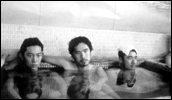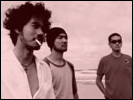19
- Year
- 2001
- Original title
- 19
- Director
- Cast
- Running time
- 83 minutes
- Published
- 18 March 2002



by Tom Mes
Kazushi Watanabe's idiosyncratic debut feature 19, based on his own 1996 short of the same name which in turn was inspired by actual events, is a film that at first glance looks like yet another addition to the 'lost youth on a rampage' canon. But closer inspection reveals a film that has less to do with social comment than with delivering an exercise in consistency. 19 is a film in which each element is linked to another, its starting point being the three enigmatic young thugs at the center of the whole story.
The premise is simple: a young man is kidnapped in broad daylight. The perpetrators are a threesome of amoral, twenty-something punks driving an old Fiat 500. They hoist Usami off his bicycle into the lace-covered backseat of the cramped little car and drive off to, well, to nowhere really. As Usami struggles to at first break free and subsequently come to grips with the situation, he is taken on a ride through the outskirts of Tokyo. The trio of kidnappers - one of whom never speaks while their leader (Watanabe himself) can hardly keep his mouth shut - go about their business; they visit the zoo, have lunch at a restaurant and go to the supermarket, all with a confused Usami in tow and a growing stack of polaroids in their pockets. It becomes increasingly clear to both Usami and the audience that his kidnappers treat him as an equal, and gradually the boy's resistance ebbs away to be replaced by a sense of belonging. When the three target another victim, he is even prepared to help.
Though Watanabe is somewhat too consciously portraying himself and his kidnapping pals as enigmatic hipsters, his ability to let every stylistic and narrative decision in his film flow from the characters is quite admirable for a first-time director (he also edited and wrote the screenplay). His love for wry comedy and dryly-delivered punchlines may owe more than a bit to the style so characteristically employed by Takeshi Kitano, but rather than imitating something for its coolness factor, Watanabe understands that this manner of storytelling fits very well with the portrayal of directionless characters dwelling comfortably on the fringes of society. Additionally, the dry absurdity is at least partially inspired by the real event upon which the film is based. 19's puzzling ending is perhaps the ultimate absurd joke of the whole film, but was one of the few elements the director kept largely unchanged from the original events - with good reason.
Another example of Watanabe's approach is the film's very peculiar look: washed-out, bleached and seemingly overlit - achieved through a process of transfers and blow-ups in the post-production process. One can point to the director's background in music videos as the source for such stylistic traits, but in 19 the visual characteristics (like the sparsely used yet intense electric guitar on the soundtrack) again provide a strong complement to the story and the characters. Rather than simply serving as style without purpose, the bleached look pervades the entire film, creating the impression of a world trapped in a vacuum, much the way the main characters are trapped in a moral vacuum of their own.
19 is further enhanced by several effective performances. Aside from Watanabe himself (whose character served as the role model for his equally enigmatic turn in Takashi Miike's Visitor Q), non-professionals Noro and Shinmyo radiate a suitably minimalist air as his partners in crime, and the ever-enjoyable Masashi Endo (of Wild Zero, Not Forgotten and A Touch of Fever fame) provides a lively counterpoint to Kawaoka's increasingly lethargic Usami. Briefly turning up in a small role as a highway patrolman is Nachi Nozawa, better known to Japanese audiences as the voice who dubs Al Pacino and Alain Delon.
Although 19 passed largely unnoticed beneath the radar of Western fans of Japanese cinema, Watanabe's particular brand of filmmaking, filtering pop culture and manga inspirations through his own particular idiosyncrasies, might well find itself becoming a bit of a cult item over the coming years.